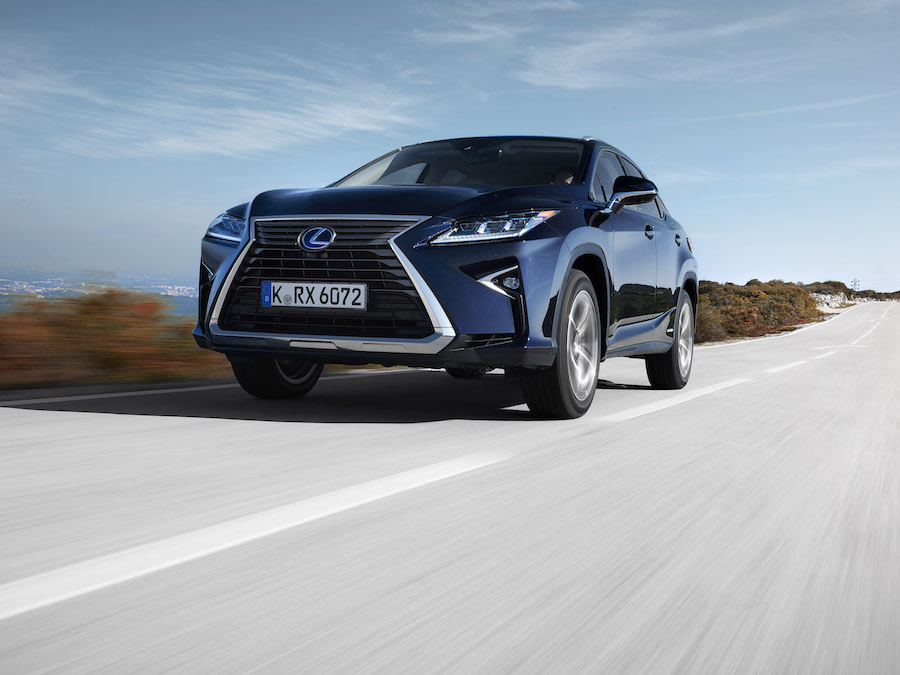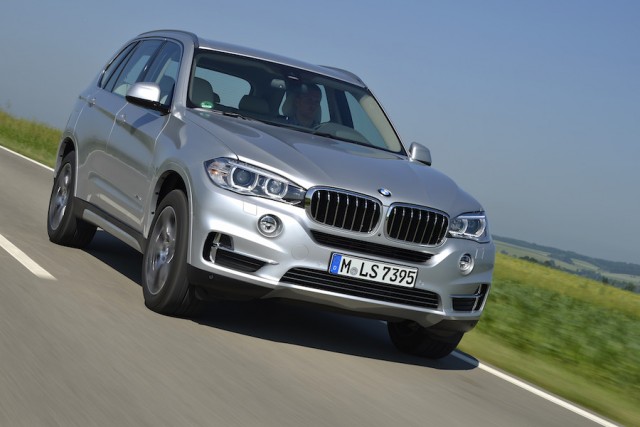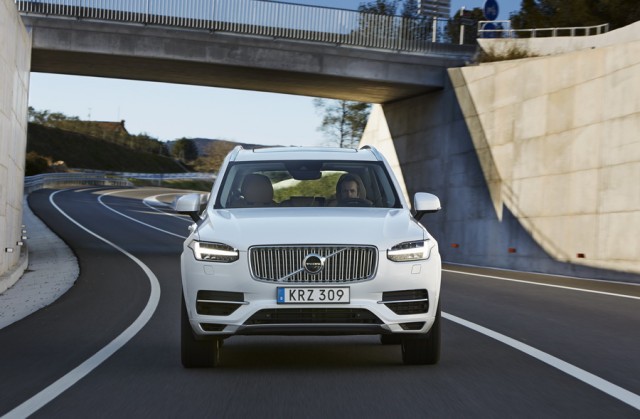The new Lexus RX hybrid SUV still majors on comfort and refinement, but it's fallen well behind in the technology race by not offering a plugin option nor a seven-seat version. Striking styling and fantastic quality can't make up for yesterday's drivetrain. It's a solid replacement for the old RX and likeable with it, but it doesn't move the game onwards.
In the metal
Not everyone is entirely on-board with Lexus' so-called "L-Finesse" styling, what with its big, aggressive 'spindle' grille, lots of jarring lines and general sense of being a bit over-styled. Personally, I like it rather a lot - it's different to what most of the other car makers are doing and it's certainly a big improvement on the rather bland, retiring styling of old-school Lexus. It perhaps works best in a dark colour, and without the extra aggression of the F Sport body kit (a Luxury spec RX in a dark metallic blue is a rather attractive thing...), but on the whole I reckon this is a handsome and distinctive machine. Different is good, after all.
Inside, things are just a touch less successful. There's a lot of good stuff going on in there. The quality levels are, as you'd reasonably expect of a Lexus, stratospherically high. Quite simply, while other cars are noticeably assembled from components, the Lexus feels machined from solid inside. The seats are great, although again I prefer the more cosseting chairs of the Premium model, rather than the slightly restrictive buckets of the F Sport. Centred in the dash is a new and utterly massive 12.3-inch screen for the infotainment and satnav, which looks amazingly impressive until you actually try to use it. Then you'll find that the mouse-based control system is awkward, while the graphics, and especially the satnav, look a bit old hat. Ultimately, there's plenty of stuff here to keep even the most tech-addicted driver happy, but it just looks a bit clunky.
Space is actually pretty good. Lexus has stretched the overall length of the RX by 120mm, and 50mm of that has gone into the wheelbase, so there's good room both front and rear, although rear seat occupants will find that there's not really anywhere to put their feet. The boot is big though and well-shaped (and accessed by a powered tailgate that reacts to gesture control - or rather lack of gesture control; you sort of hover your hand over the rear badge to activate it), but the rub there is that there is no seven-seat option, unlike all of its major competitors save the Mercedes-Benz GLE. Lexus say it has looked at doing one, but it's not on the table at the moment.
Driving it
Neither are a plugin hybrid and modern lithium ion batteries in the pipeline. Now, Lexus told us that, in both cases, it feels that the time is not yet right to introduce the technology. Plugin hybrid, the engineers say, is still not gaining enough traction with the public to justify the expense, while Lexus' ever-increasing experience with the old-style nickel batteries means, so it claims, that it can get similar power out of the stack to what could be achieved with a lithium-ion battery, but at a lower cost and with better reliability.
All of which is fair enough - after all, Lexus (and Toyota) has more experience with hybrids than any other car maker, save Honda, and you'd have to take its word on such matters, to a certain extent. But it does mean that the new RX is going into battle with one hand tied behind its back. With no plugin capability, it's now lagging behind what can be offered by the BMW X5 and Audi Q7, and the drivetrain as a whole is less satisfying than that offered by the Germans.
As usual in a Lexus hybrid, the chief culprit is the CVT transmission. Under most driving situations, it's fine - smooth and seamless and with the natural refinement of the 3.5-litre V6 petrol engine, all is serene. However, ask for brisk acceleration or, worse, drive up a long, twisting incline and suddenly the engine is revving its head off at over 4,000rpm and the fuel consumption is taking a major nose-dive. It's an issue we've been raising with Toyota and Lexus ever since the Hybrid Synergy Drive module was first introduced, but the engineers say it's the most efficient way of getting the power and keeping the fuel economy down.
Really? Because in reality what you mostly get is a drivetrain that too often sounds awkward and strained, and economy that signally failed to dip below the 9.0 litres per 100km mark over a day's mixed town, country and motorway driving. Drive it mostly in town, and gently, and you might squeeze the requisite economy out of it. Otherwise, you're on a hiding to nothing.
As for handling, again, it's best driven gently. Lexus has made great claims of the RX's improved agility and its new adaptive dampers with their 30 separate stiffness settings, but press hard on a poorly surfaced road and the RX just feels jiggly (the optional 20-inch wheels of our test car may be partially to blame there) and generally unenthusiastic. A hefty kerb weight doesn't help and nor does steering that lacks utterly the sweetness and incision of the Lexus IS or GS saloons. On the motorway and on straighter, smoother roads it's an utter joy in which to travel though - smooth, stable and almost totally quiet, with a cracking Mark Levinson stereo system to keep you entertained.
What you get for your money
The RX has taken a significant jump in price, part of which can be accounted for by the presence of the smaller, more affordable Lexus NX crossover in the range. It's still pretty good value for money, and you do get a lot of toys (leather, heated seats, standard automatic transmission, Lexus's Safety System Plus, which includes lane departure warning, autonomous braking, adaptive cruise control and more), as well as ten airbags. It does lose some of that value proposition the further up the range you go, and by the time you get to the €83k F Sport model, the unavoidable fact is that BMW will sell you an X5 xDrive40e plugin hybrid for €10k less.
Summary
Lexus wants to score significant numbers of conquest sales from other brands with this car and, with the best will in the world, I don't see where those customers are going to come from. When the Germans and the Swedes can offer more high-tech for the same money or less, other than its peerless reputation for reliability, Lexus is lacking any headline-grabbing innovations with which to convince customers. Nonetheless, taken in isolation, the Lexus RX 450h is actually a very pleasant car. There's no denying the sheer feel-good sensation from simply sitting in something this well-made; its comfort and refinement levels are off the scale and, as I mentioned earlier, I like the way it looks. Existing RX owners are going to be very happy if and when they trade-in.











































